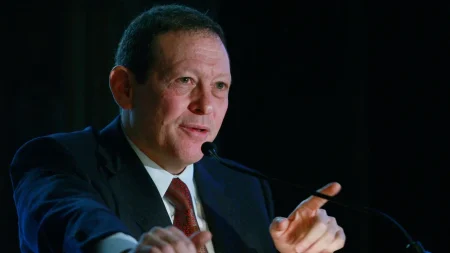Oil Billionaires’ Interests at Stake as Supreme Court Hears Crucial Environmental Case
The Supreme Court is currently hearing arguments in Seven County Infrastructure Coalition v. Eagle County, Colorado, a case with significant implications for the oil and gas industry and the scope of environmental reviews for major infrastructure projects. The case centers around a proposed railway in Utah and the extent to which federal agencies must consider indirect environmental impacts, such as those related to oil and gas drilling and climate change, when approving such projects. The railway’s proponents argue that a lower court ruling requiring a broader environmental review exceeded the requirements of the National Environmental Policy Act (NEPA). A ruling limiting the scope of NEPA reviews could streamline the approval process for oil and gas projects, potentially benefiting industry giants and sparking concerns about environmental protection.
High Stakes for the Oil and Gas Industry: Billionaires Weigh In
The oil and gas industry has a vested interest in the outcome of this case. A narrower interpretation of NEPA could significantly reduce regulatory hurdles and expedite project approvals. Billionaire Philip Anschutz’s Anschutz Exploration Corporation filed an amicus brief urging the Supreme Court to restrict the scope of environmental reviews. The brief argued that a broad interpretation of NEPA allows opponents to delay or halt projects based on speculative, indirect impacts. Similarly, Energy Transfer LP, founded by billionaires Kelcy Warren and Ray Davis, also submitted a brief advocating for limited reviews, claiming that NEPA has been "weaponized" by anti-oil and gas groups to obstruct projects. These billionaires, among others whose fortunes are tied to the oil and gas sector, stand to gain considerably from a ruling that weakens environmental regulations.
Justice Gorsuch Recuses Himself Amidst Concerns Over Ties to Anschutz
Adding another layer of complexity to the case is the recusal of Justice Neil Gorsuch. While he offered no official explanation, his decision followed scrutiny of his long-standing professional relationship with Philip Anschutz. Gorsuch previously represented Anschutz and his companies in legal matters, and Anschutz reportedly lobbied for Gorsuch’s appointment to the 10th Circuit Court of Appeals. These ties raised concerns about potential bias and prompted calls for Gorsuch’s recusal from the case. While Gorsuch has recused himself from Anschutz-related cases in the past, the Supreme Court operates under different ethics guidelines, raising questions about the influence of such relationships on judicial decisions.
Implications for Environmental Protection and Regulatory Oversight
The Seven County Infrastructure case has broader implications for environmental protection and the balance between development and regulatory oversight. Environmental groups argue that limiting the scope of NEPA reviews could undermine efforts to mitigate the environmental impacts of major infrastructure projects, including those related to climate change. They contend that a narrow interpretation of the law ignores the interconnectedness of environmental systems and the potential for cumulative impacts. The Supreme Court’s decision in this case could set a precedent for future environmental reviews and influence the development of energy infrastructure across the country.
Supreme Court’s Track Record on Environmental Cases
The current Supreme Court, with its conservative majority, has demonstrated a tendency to favor deregulation, particularly in environmental matters. Recent rulings have curtailed the Environmental Protection Agency’s authority to regulate emissions, weakened protections under the Clean Water Act, and temporarily blocked policies aimed at reducing air pollution. These decisions, coupled with the court’s willingness to limit federal agencies’ interpretive power, raise concerns about the future of environmental regulations and the ability of agencies to address climate change and other environmental challenges.
The Intersection of Wealth, Politics, and the Judiciary
The Seven County Infrastructure case highlights the intersection of wealth, politics, and the judiciary. The involvement of billionaire oil and gas magnates, the scrutiny of Justice Gorsuch’s ties to Anschutz, and the Supreme Court’s track record on environmental issues raise questions about the influence of powerful interests on judicial decision-making. The lack of a binding ethics code for Supreme Court justices further fuels concerns about transparency and accountability. The outcome of this case could have far-reaching consequences for environmental policy and underscore the ongoing debate about the role of money and influence in the highest court of the land. The court’s decision, expected later this year, will undoubtedly shape the future of environmental regulation and the balance between economic development and environmental protection.









